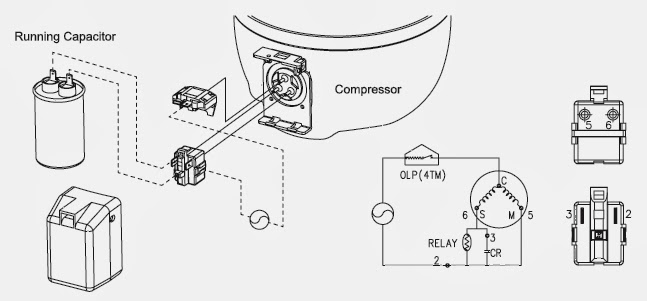Fridge Not Cooling? The Compressor Start Relay Might Be the Culprit

Is your refrigerator humming but not cooling? Before you panic and call an expensive repair technician, consider this: the problem might be a simple, inexpensive part called the compressor start relay. Understanding this little device can save you a significant chunk of change and empower you to take control of your appliance repairs.
The compressor is the heart of your refrigerator, responsible for circulating refrigerant and keeping things cold. But this powerful component needs a little help getting started, and that’s where the compressor start relay comes in. This device provides a temporary boost of power to get the compressor motor spinning, much like a jumpstart for a car. Without a functioning compressor relay, your fridge's compressor may struggle to start, leading to a warm refrigerator and spoiled food.
Early refrigerators relied on simpler starting mechanisms, but as compressor technology evolved, the need for a more sophisticated starting device arose. The modern compressor start relay emerged as a reliable and efficient solution. Its importance lies in its ability to protect the compressor motor from damage during startup and ensure consistent cooling performance. A malfunctioning relay can lead to a variety of issues, including a constantly running compressor, a fridge that cycles on and off too frequently, or a complete failure to cool.
Understanding how a compressor start relay functions is crucial for diagnosing and resolving refrigerator cooling problems. The relay contains a set of electrical contacts that close when power is applied, sending a surge of electricity to the compressor's start winding. Once the compressor reaches a certain speed, the relay disengages, and the compressor continues to run on its run winding. This ingenious mechanism prevents the start winding from overheating and ensures efficient operation.
A faulty compressor starting device can be the source of many refrigerator woes. If your fridge is making a clicking noise but not cooling, the relay might be the culprit. Similarly, a constantly running compressor or one that cycles on and off rapidly can also indicate a problem with the starting relay. Addressing these issues promptly can prevent further damage to your compressor and save you from costly repairs down the line.
The refrigerator start relay, often located near the compressor at the back of the fridge, is usually a small, black cylindrical component. It plays a vital role in the efficient operation of your refrigerator.
Benefits of a functioning relay include: efficient compressor startup, prolonged compressor lifespan, and consistent cooling performance.
If you suspect a faulty relay, unplug the refrigerator, locate the relay, and inspect it for signs of damage, such as burning or melted plastic. Replacements are readily available at appliance parts stores.
Advantages and Disadvantages of Compressor Start Relays
| Advantages | Disadvantages |
|---|---|
| Relatively inexpensive to replace | Can fail over time |
| Protects the compressor motor | Requires correct installation |
| Ensures efficient compressor startup | Can be difficult to access in some refrigerators |
Best Practices: 1. Always unplug the refrigerator before working on any electrical components. 2. Use a multimeter to test the relay for continuity. 3. Ensure the replacement relay is compatible with your refrigerator model. 4. Handle the relay with care to avoid damaging the terminals. 5. If unsure, consult a qualified technician.
Example: A clicking sound from the back of the fridge indicated a faulty relay. Replacing it resolved the issue.
Challenge: Difficulty locating the relay. Solution: Consult the refrigerator's service manual.
FAQ: What does a compressor start relay do? It provides a boost of power to start the compressor.
Tips: Regularly inspect the relay for signs of wear and tear. Keep the area around the compressor clean and free of dust.
In conclusion, the fridge compressor start relay is a small but crucial component that plays a vital role in the efficient operation of your refrigerator. Understanding its function and how to troubleshoot potential issues can empower you to save money on costly repairs and extend the life of your appliance. By learning about the common signs of a failing relay, you can proactively address potential problems before they escalate into major headaches. Taking the time to inspect and replace a faulty relay is a small investment that can pay off big time in the long run. So, next time your fridge starts acting up, don't panic – check the compressor start relay! It could be the simple solution you're looking for, saving you time, money, and the frustration of spoiled food. Remember, a little DIY knowledge can go a long way in keeping your household appliances running smoothly and your wallet happy. Don't be afraid to get your hands dirty and tackle this simple repair yourself. Your fridge (and your finances) will thank you.
Unlocking bucks county court records your guide to prothonotary case searches
Building empires the viking construction company inc story
Understanding humana gold plus medicare













